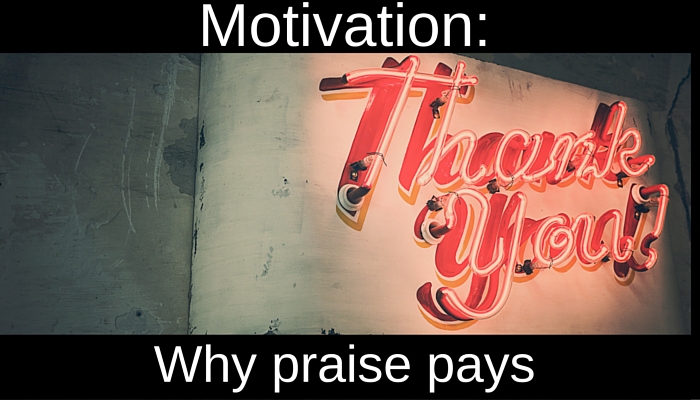 When motivating IT Project Management team members, praise, gratitude and recognition for ‘a job well done’ can be as powerful as a raise, a bonus or a promotion.
When motivating IT Project Management team members, praise, gratitude and recognition for ‘a job well done’ can be as powerful as a raise, a bonus or a promotion.
If not more so.
Think about it yourself.
Your monthly salary is what you’ve earned in return for your services – that’s what’s owed to you! Nice to get a little bit more but you’re still just getting paid your dues! Your bonus only goes so far, a promotion looks good on your business card but actually just means more work and responsibility, HOWEVER…
When you sit before the board, upon successful delivery of an IT project and you bask in the glorious praise of the C-suite suits… feels good, doesn’t it? It inspires and lifts you onto the next project.
Similarly, when your team members win ‘Employee of the Month’ or get given a bottle of their favourite tipple the warm glow inspires them to try harder.
Personally, I think that it’s even more important to give praise in IT Project Management where failure statistics are routinely published and shared with little thought on their effect on morale. For the record, a Google search for “project management success” returns more than twice as many results as “project management failure” (37.5m vs 18.3m 24/07/16). The reason is simple…
YOU are doing an incredible job!
A bit of praise… hope you have the warm glow!
Like most warm glows though, it fades. Praise and recognition, therefore, have to be repeated leadership habits not just once in a while pleasantries.
The value gained from other motivational techniques fade too and this one of the reasons why praise is such a potent and useful tool to have in your leadership skillset – it’s repeatable.
A promotion is a great way to motivate but if you had to keep repeating that both you and your CIO would soon be out of a job! A bonus is nice to take home for Christmas but if you had to repeat that when it had been spent your firm would be bankrupt by the summer.
Praise and recognition are repeatable and cost nothing!
A word of warning here though.
I consulted once on an IT project that was floundering. The team had low morale and yet the Project Manager was enthusiastic and at first blush seemed generous with his praise. Upon further investigation, it turned the team members did not think their leader’s praise was genuine. “Gushy” and “full of it” were words used to describe him – “he praises everything!”
The praise had become so diluted that it was no longer cutting through and having the desired motivational effect.
Make the phrase “praise where praise is due” your mantra.
Indeed, when Gallup surveyed on the subject they concluded that ‘unearned praise can do more harm to an individual and a workgroup than none at all’.
What Should You Praise – and How?
There has been a lot of research on the subject. As a benchmark I’d say that to be effective praise should be;
i) Specific – make sure team members are clear what they’ve done well.
ii) Public – sharing praise among co-workers amplifies the effect on the individual but also raises the game of others who want a piece of the action!
iii) Timely – praise should be as close to execution as possible. The more immediate the better!
iv) Regular – (but not where it’s not due!)
For further reading, I would recommend “The Carrot Principle: How the Best Managers Use Recognition to Engage Their People, Retain Talent, and Accelerate Performance by Adrian Gostick and Chester Elton. It demonstrates how when managers effectively recognise the work of their employees, they have lower staff turnover rates than other managers and achieve better strategic results.
What is more, managers effective at giving this kind of feedback are perceived as being much stronger in areas such as goal-setting, communication, trust and accountability. So it’s win/win.
Praising and recognising the efforts of your team can reap highly positive gains in an IT Project management environment. It makes the recipient feel good in a world where much talked about and well published ‘failure’ rates can have a very negative effect on morale.
From an organisational point of view, praise can bolster a team member’s commitment to both the firm and you, their manager. However, it needs to be delivered effectively – so get good at it!
Get in the habit of praising genuine achievements in a timely, constructive and specific manner and you will reap the benefits!

